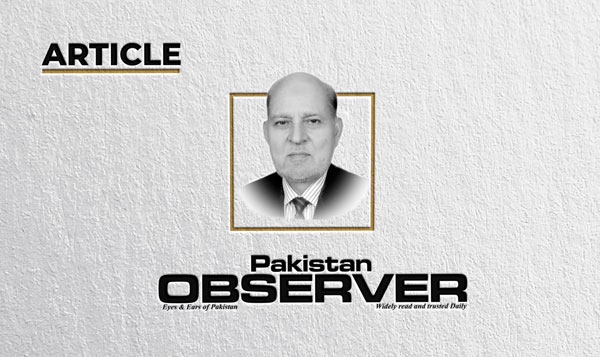Pakistan’s domestic & foreign policy imperatives
THIS is the age where geopolitics are again taking precedence over geo-economics due to the seemingly cold war-like scenario prevailing between the US/West and Russia/China in two different theatres.
Between the US/West and Russia, mainly as a result of the war between Russia and Ukraine, where the US/EU supports Ukraine, with heavy economic sanctions against Russia.
On the other hand, Russia is firm on its declared policy that the inclusion of Ukraine into NATO is its Red Line.
Between the US/its allies and China, indicated by the USA’s already declared Indo-Pacific Policy and the USA’s recent declaration in its National Security Policy that China poses a major geopolitical challenge.
However, geo-economics still remains more important in view of the inflation prevailing in the world initially due to the COVID-19 economic restrictions and now due to the impact of the Russia-Ukraine war.
Inflation is also affected by tension between the US and China due to the Taiwan question, US economic restrictions on China and Chinese counter-measures.
Because of the aforementioned cold war-like situation, the world powers as well as other nations of the world are already facing the brunt of the rising inflation.
Currently, the EU countries are suffering from energy shortage as Russia has stopped the supply of gas for them, and as a consequence, the EU is trying to reduce the dependence of its member countries on the Russian gas and oil, although some EU countries are differing with this EU policy.
Other countries, particularly third world countries, are also facing high inflation and need sustained foreign economic aid to help their people.
Due to the above-mentioned tension between the US/EU and Russia/China, other countries, particularly the third world countries are also facing the US/Western powers’ pressure to choose sides between them and Russia, and between them and China, failing which they might not get the required financial and military assistance.
In this context, Pakistan and India have faced pressure to vote in the UNSC/the UNGA against Russia, which both have resisted so far.
Nevertheless, on India’s insistence, the US has already gifted it the exemption to preserve its long standing strategic relations with Russia, based on India’s assurance that it will remain the US ally in its Indo-Pacific policy against China.
The US has also recently improved its economic/military relations with Pakistan possibly based on Pakistan’s significance as a mate to counter terrorism in this region and as the shortest land route for the USA’s economic relations with Afghanistan/Central Asian Republics.
Nevertheless, the US reservations regarding Pakistan’s strategic relations with China and the growth of the CPEC and the Gwadar port by China still remain, as over here India also exploits its position as the US ally in its Indo-Pacific policy against China.
Although, in reality the CPEC is purely an economic-oriented project which is necessary for Pakistan’s trade and foreign investment-based economic growth.
In this context, due to the likely continuing tension of the Russian-Ukrainian war, for its commercial interests, Russia is also likely to join the CPEC.
At the domestic front, Pakistan’s economy is under pressure of the continuing devaluation of the Rupee and rising inflation, mainly due to its obligations of paying back the annual heavy foreign loan instalments, Pakistan’s limited foreign exchange reserves, its insufficient annual export earnings, its heavy import bill and the foreign remittances being spent for paying the import bill and to reduce annual budget deficits.
To achieve economic stability, Pakistan needs political stability and continued economic policies for at least ten to fifteen years.
In this context, Pakistan needs continued economic support from the IMF and friendly countries as well.
Pakistan also needs the required military assistance to keep its defence forces properly equipped to fight the ongoing terrorism on its western border and to face the continuously prevailing threat from India due to the tense Jammu and Kashmir situation complicated by India’s 5 August 2019 action of dividing the state into two union territories.
India also continues to acquire modern weapons systems from the United States/West and Russia.
Pakistan also needs the diplomatic support of all great powers to resolve Kashmir conflict with India in the light of Security Council resolutions.
Taking into account the above-mentioned international and national scenarios, Pakistan is currently facing domestic and foreign policy challenges for the next 15 years.
At the domestic level, Pakistan needs to stabilize its economy, by enabling it to return its annual loan instalments by saving on the imports bill by getting cheaper oil, gas and wheat as offered by countries like Russia, increasing economic growth rate based on CPEC-related foreign investment and trade, and maintaining the existing exports with the US/EU and other friendly countries.
Pakistan also requires to increase the foreign exchange reserves by increasing the exports by providing subsidies in the electricity and raw material to the export-related industry, continuing with the IMF loan programme and getting financial support from the friendly countries, including China, the friendly Muslim countries, the US/EU countries and encouraging Russia to join the CPEC and laying of gas pipeline, especially the TAPI.
In view of the above-mentioned requirement of stabilizing the economy, Pakistan also faces the domestic challenge of attaining the political stability for gearing up the required economic activity, by the quick decision/law making and continuation of the economic policies.
At the foreign front, to meet its above-mentioned economic, trade, diplomatic and strategic/military needs, Pakistan’s foreign policy managers face major foreign policy challenges of meeting the imperatives of building and maintaining good relations with the US/EU countries, Japan and South Korea and at the same time with its strategic relations with China and good relations with Russia, despite their persisting competition/tension.
Thus, in the next 10 to 15 years, whereas Pakistan’s domestic policy needs a pragmatic handling by competent political/and economic managers, its foreign policy would require expert diplomacy by exceptionally good diplomats.
—The writer is also a former Research Fellow of IPRI and Senior Research Fellow of SVI Islamabad.










